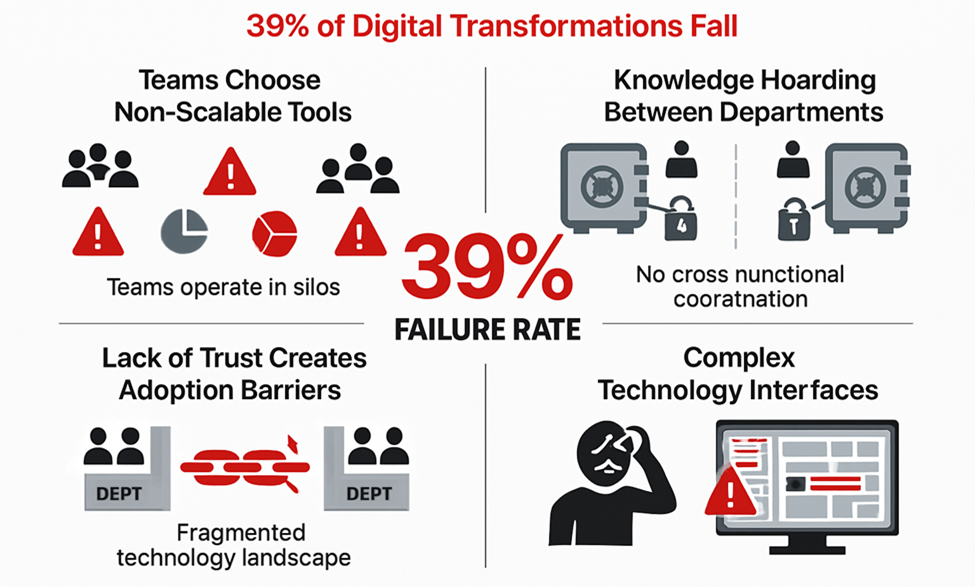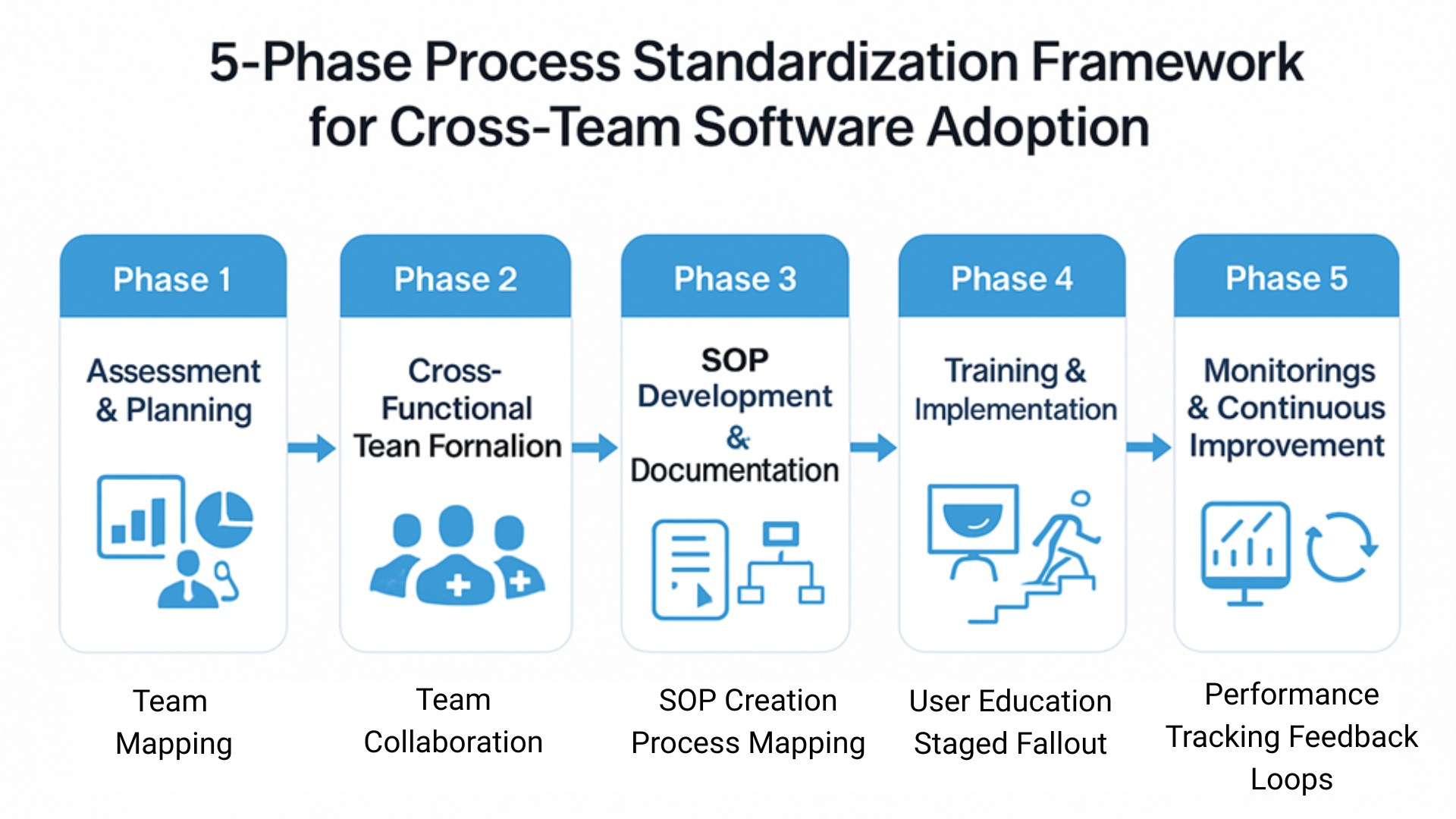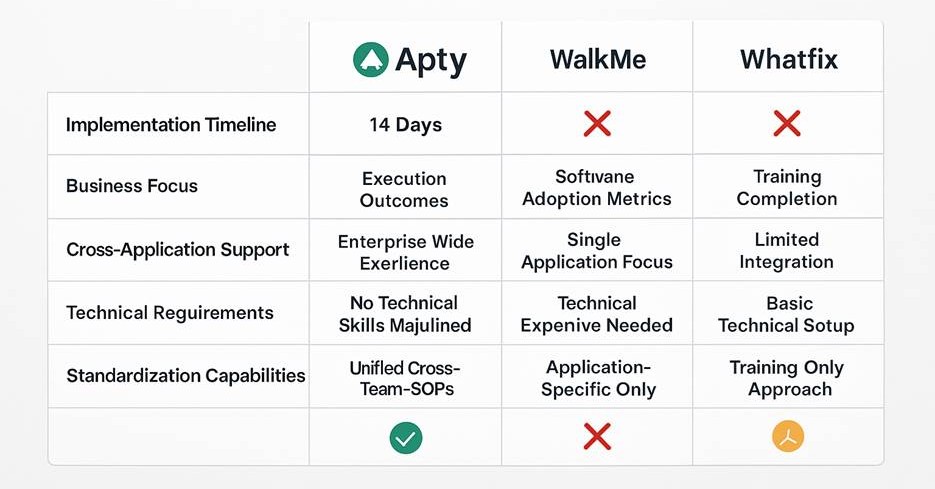Table of Contents
- Overview
- The Multi-Team Software Adoption Crisis
- Building Cross-Team SOPs for Scalable Software Adoption
- Implementation Strategy for Regulated Industries
- The Apty Advantage in Regulated Environments
- Measuring Compliance Success and ROI
- Future-Proofing Your Compliance Strategy
- Take Action: Transform Your Compliance Strategy Today
- Why Apty Leads in Cross-Team Process Standardization
- FAQs
- Transform Your Enterprise Software Adoption Strategy
Overview
39% of digital transformation efforts fail due to resistance to change, yet enterprises continue deploying software without standardized adoption frameworks. This staggering statistic reveals a fundamental disconnect between enterprise ambitions and the realities of execution. While organizations invest millions in cutting-edge software solutions, they consistently underestimate the complexity of achieving consistent adoption across multiple teams, departments, and operational contexts.
The modern enterprise operates as a complex ecosystem of interconnected teams, each with distinct workflows, priorities, and technological preferences. When new software is introduced without a structured adoption playbook, the result is predictable chaos. Some teams embrace the technology while others resist, creating operational silos that undermine the very efficiency gains the software was meant to deliver.
This challenge extends far beyond simple user training or change management. It requires a fundamental reimagining of how enterprises approach cross-team SOPs and systematic SOP implementation that ensures consistent, scalable adoption across the entire organization. The solution lies not in hoping for organic adoption, but in creating a comprehensive process standardization framework that transforms software deployment from a chaotic experiment into a predictable, measurable business outcome.
The Multi-Team Software Adoption Crisis

The enterprise software adoption crisis stems from a fundamental misunderstanding of how teams actually operate within large organizations. While executives envision seamless technology rollouts that immediately boost productivity, the reality on the ground tells a dramatically different story.
Teams consistently choose tools that don’t scale effectively across organizations, creating a patchwork of incompatible solutions that fragment rather than unify operational capabilities. This phenomenon occurs because individual teams prioritize their immediate needs over enterprise-wide consistency, leading to technology decisions that optimize local efficiency while undermining global coordination.
Knowledge hoarding represents another critical barrier to successful cross-team adoption. Employees often keep their expertise to themselves out of fear that colleagues will “steal” their knowledge and take credit for successful outcomes. This protective behavior becomes particularly pronounced during software transitions, when team members who master new tools may view their expertise as job security rather than organizational assets to be shared.
The lack of trust between departments creates additional adoption barriers that traditional training programs fail to address. When teams have never collaborated effectively, introducing new software that requires cross-functional coordination often amplifies existing tensions rather than resolving them. Employees may resort to social loafing if they don’t trust other team members to contribute meaningfully, causing the most productive individuals to disengage from collaborative initiatives entirely.
Building Cross-Team SOPs for Scalable Software Adoption

Implementation Strategy for Regulated Industries
Successful implementation of Digital Adoption Platforms in regulated eCommerce environments requires a systematic approach that addresses the unique challenges and requirements of compliance-driven organizations. The framework must balance the need for rapid deployment with the rigorous validation and documentation requirements that characterize regulated industries.
Phase 1 of implementation focuses on comprehensive compliance assessment and strategic planning. This phase begins with detailed mapping of current regulatory requirements across all relevant frameworks and jurisdictions. For pharmaceutical organizations, this mapping encompasses FDA regulations, DEA requirements, state pharmacy board rules, and international standards for markets where the organization operates. Financial services organizations must map PCI DSS requirements, banking regulations, AML obligations, and jurisdiction-specific payment processing rules.
The current state analysis examines existing SOP systems, compliance procedures, and operational workflows to identify gaps, inefficiencies, and areas of regulatory risk. This analysis extends beyond documentation review to include observation of actual operational practices, interviews with key personnel, and assessment of system capabilities and limitations. The goal is to understand not only what procedures are documented, but also how they are actually followed in practice and where deviations occur.
The Apty Advantage in Regulated Environments
Apty’s approach to Digital Adoption Platform technology represents a fundamental advancement in how regulated industries can achieve and maintain operational compliance in eCommerce environments. While traditional compliance systems focus primarily on training completion metrics and user engagement scores, Apty delivers measurable business outcomes that directly address the compliance challenges facing modern organizations.
The business execution focus that distinguishes Apty from competitors becomes particularly valuable in compliance environments where failures can result in severe financial penalties, operational shutdowns, and reputational damage. Rather than measuring success through training completion rates or user engagement metrics, Apty focuses on compliance outcomes, error reduction, and regulatory risk mitigation.
Rapid implementation capabilities provide regulated organizations with the ability to achieve compliance improvements within 14 days of deployment, a timeline that contrasts sharply with the months-long implementations typically required by traditional compliance systems. This speed advantage stems from Apty’s implementation methodology that prioritizes high-impact compliance processes and leverages pre-built guidance frameworks for common regulatory requirements.
Measuring Compliance Success and ROI
Effective measurement of compliance program success in regulated eCommerce environments requires sophisticated metrics that capture both immediate operational improvements and long-term strategic value. Traditional ROI calculations often fail to account for the unique value proposition that compliance represents in regulated industries, where the cost of failure far exceeds the investment required for success.
Compliance audit success rates provide the most direct measure of program effectiveness, reflecting the organization’s ability to demonstrate regulatory compliance during formal inspections and reviews. Organizations implementing comprehensive DAP solutions typically see audit success rates improve from industry averages of 60-70% to consistently above 95%. This improvement reflects not only better compliance practices but also the comprehensive documentation and audit trail capabilities that DAP platforms provide.
Error reduction percentages demonstrate the platform’s impact on operational quality and regulatory risk. Pharmaceutical organizations implementing DAP solutions for controlled substance dispensing typically see error rates decrease by 40-60% within the first six months of deployment. Financial services organizations report similar improvements in payment processing accuracy and fraud detection effectiveness. These improvements also help build customer trust and operational confidence, which can indirectly increase AOV in eCommerce.
Future-Proofing Your Compliance Strategy
The regulatory landscape governing eCommerce operations in regulated industries continues to evolve at an accelerating pace, driven by technological advancement, changing business models, and increasing regulatory sophistication. Organizations that want to maintain a competitive advantage must develop compliance strategies that can adapt to these changes while maintaining operational effectiveness.
AI-powered compliance monitoring represents the next frontier in regulatory technology, providing capabilities that extend far beyond traditional rule-based systems. Machine learning algorithms can identify patterns in operational data that indicate potential compliance risks before they result in actual violations. Natural language processing can monitor communications and documentation for compliance issues that might escape human review. Predictive analytics can forecast regulatory changes based on industry trends and regulatory agency priorities.
The organizations that thrive in this evolving regulatory environment will be those that embrace technology-enabled compliance strategies while maintaining focus on fundamental compliance principles. Success will require not only sophisticated technology platforms but also organizational cultures that prioritize compliance, leadership that understands regulatory requirements, and operational processes that embed compliance into every aspect of business operations.
Take Action: Transform Your Compliance Strategy Today
The evidence is clear: traditional approaches to SOP compliance in regulated eCommerce environments are failing at an unprecedented rate, creating risks that threaten not only individual organizations but entire industries. The solution lies not in incremental improvements to existing systems but in the fundamental transformation of how compliance is conceived, implemented, and maintained.
The first step in this transformation is an honest assessment of your organization’s current compliance capabilities and vulnerabilities. Where are your greatest regulatory risks? Which processes are most likely to fail during regulatory inspections? How confident are your employees in their ability to follow complex compliance procedures correctly? These questions require candid answers that may be uncomfortable but are essential for effective improvement.
The time for action is now. Every day that passes without effective compliance systems in place is another day of regulatory risk, operational inefficiency, and competitive disadvantage. The organizations that act decisively to transform their compliance capabilities will emerge as leaders in their industries, while those that delay will find themselves increasingly vulnerable to regulatory enforcement and market disruption.
Ready to transform your compliance strategy and eliminate regulatory risk? [Book a demo](https://apty.ai/book-a-demo/) with Apty’s compliance experts to discover how Digital Adoption Platform technology can revolutionize your approach to SOP compliance in regulated eCommerce environments.
Why Apty Leads in Cross-Team Process Standardization

Apty’s approach to Digital Adoption Platform technology represents a fundamental advancement in how enterprises can achieve consistent, scalable process standardization across multiple teams and complex operational environments.
The business execution focus that distinguishes Apty from traditional software adoption tools becomes particularly valuable in cross-team standardization scenarios. Rather than measuring success through training completion rates or user engagement metrics, Apty focuses on actual business outcomes: consistent process execution, reduced operational variability, and measurable improvements in cross-team coordination effectiveness.
Rapid implementation capabilities enable organizations to achieve standardization within 14 days of deployment, a timeline that contrasts dramatically with the months-long implementations typically required by traditional process management systems. This speed advantage stems from Apty’s methodology that prioritizes high-impact standardization opportunities and leverages pre-built guidance frameworks for common cross-team coordination challenges.
Cross-application excellence ensures that standardized processes work consistently across the diverse technology ecosystems that characterize modern enterprises. Unlike competitors that focus on single applications or require extensive technical integration, Apty provides seamless process guidance across multiple systems without requiring specialized technical skills for implementation.
Key Takeaways
- Unstructured software rollouts are a leading cause of failed digital transformations, especially in enterprises with multiple, diverse teams operating in silos.
- Process standardization frameworks are essential for scalable software adoption, they provide structure, consistency, and accountability across departments without stifling team autonomy.
- Cross-functional collaboration is critical to building SOPs that actually work. Including representatives from each department ensures buy-in and operational relevance.
- Modern tools like Apty provide real-time process guidance and automated compliance monitoring, enabling faster, more consistent adoption across applications and teams.
- The biggest barriers to adoption aren’t technical—they’re human. Trust issues, knowledge hoarding, and cultural misalignment must be addressed alongside SOP creation.
Enterprises that prioritize process standardization gain a measurable edge, transforming software investments into operational improvements and strategic agility.
FAQs
Transform Your Enterprise Software Adoption Strategy
The evidence is overwhelming: organizations that implement systematic process standardization frameworks achieve dramatically better software adoption outcomes than those that rely on ad hoc approaches. Cross-team SOPs provide the foundation for consistent, scalable adoption that delivers measurable business value rather than simply checking implementation boxes.
The competitive advantage belongs to enterprises that recognize process standardization as a strategic capability rather than a tactical necessity. Organizations that master cross-team coordination through systematic SOP implementation position themselves to leverage technology investments more effectively, respond to market changes more rapidly, and scale operations more efficiently than competitors still struggling with fragmented adoption approaches.
Ready to transform your enterprise software adoption strategy and eliminate the chaos of fragmented multi-team implementations? Book a demo with Apty’s standardization experts to discover how cross-team SOPs can deliver consistent results across your organization and turn software investments into measurable competitive advantages.
